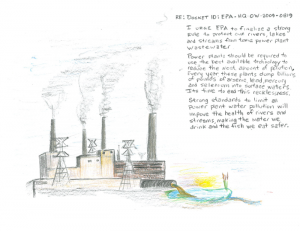By Jennifer Peters, National Water Campaigns Coordinator
Since late May our organizers have been going door to door to talk about a huge problem that many people don’t know about – toxic water pollution from power plants, mostly coal plants. Everybody knows that coal-fired power plants foul our air, but few people know the alarming fact that power plant utilities dump more lead, arsenic, mercury and other harmful pollutants into our water than the top nine other polluting industries
combined. That amounts to an estimated 5.5 billion pounds of nasty pollutants dumped into our rivers, lakes, streams and bays every year.
Many of the people we spoke with at the door were shocked to learn about this problem. Many were angered that power plants have been allowed to treat our precious water bodies like open sewers, even though affordable technologies exist today to make dumping of wastewater unnecessary.
And more than 20,000 of them were compelled enough to handwrite letters to the Environmental Protection Agency, urging them to put an end to this reckless practice.
I’ve read many of those letters. One woman wrote that she “feels like it’s 1810 all over again.” Another woman wrote “I don’t need a PhD to know that EPA standards for waste management and dumping should be evaluated as frequently as necessary, and should either keep up with or surpass the technology that industries use.” And a grandfather wrote “I don’t think I’ll be around….but my son and grandson will feel the effects of this pollution. Don’t let the polluters set the rules.”
But the polluters WILL set the rules unless enough of us stand up and voice our support for a strong rule that will require power plants to eliminate or drastically reduce the amount of pollution they dump in our water. Today is the LAST DAY to submit a comment on EPA’s proposed rule to limit toxic wastewater discharges from power plants. Please add your voice to the choir of
more than 165,000 citizens that have already sent an email or handwritten a letter asking EPA to require power plants to stop dumping their waste into our water.
Click HERE to submit a comment.



